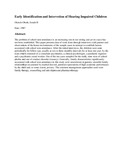| dc.description.abstract | The problem of school non-attendance is an increasing one in our setting and yet its cause has not been established. This paper presents data of work done through interviews with parents and observations of the home environments of the sample cases in attempt to establish factors associated with school non-attendance. After the initial interviews, the children were seen periodically for follow-ups, usually at two to three monthly intervals for at least one year, by the team which consisted of a consultant psychiatrist, a clinical psychologist, a paediatric registrar and a psychiatric social worker. Out of the ten cases sampled for the study, nine were of school phobia and one of conduct disorder (truancy). Generally, family characteristics significantly associated with school non-attendance in this study were neuroticism in parents, unstable family relationships occasioned by marital discord, parental expectations of high academic performance by the child and, to some extent, poverty. The common management approaches used were family therapy, counselling and anti-depressant pharmacotherapy | en |

